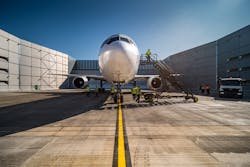MoU Signed to Develop Liquid Hydrogen Fuel System Solutions for Zero-Emission Aircraft
GKN Aerospace, Marshall, and Parker Aerospace have signed a Memorandum of Understanding (MoU) to explore liquid hydrogen fuel system solutions for the next generation of zero-emission aircraft and sustainable aviation.
The partners will not only develop the liquid hydrogen fuel system to support both hydrogen-electric and combustion applications but also use their expertise to design, test, certify, and manufacture fuel systems for aerospace applications.
“Hydrogen fuel systems play a critical role in achieving zero emissions in aviation, and we are confident that this partnership will enable us to further advance our expertise in this area and drive the development of innovative solutions that support a more sustainable future,” said Tracy Rice, VP Technology and Innovation for Parker Aerospace.
The collaboration will benefit from the ongoing UK Aerospace Technology Institute funded, GKN Aerospace-led, H2GEAR program, which will ground test a scalable hydrogen electric fuel cell propulsion system in 2025. The goal is to bring the complete scalable fuel system and propulsion system together in a single flight test bed environment before 2030.
GKN Aerospace also signed a collaboration MoU to explore an integrated flight demonstration of the end-to-end system at the Paris Air Show in June.
The system will help support a wide range of aircraft, including commuter planes (under 19 passengers), business jets, and regional aircraft (up to 100 passengers). Studies are in progress to discover the scalability of the system for larger narrow-body aircraft.
“By working alongside Marshall and Parker, who have deep expertise in fuel systems, we can accelerate the development of the technology building blocks required for a complete hydrogen propulsion system for mid-range aircraft,” said Russ Dunn, CTO GKN Aerospace.
The aviation industry aims to achieve net zero emissions by 2050 through hydrogen propulsion by fuel cells or combustion.
